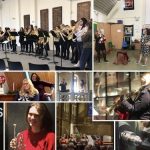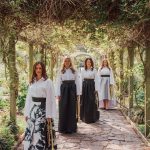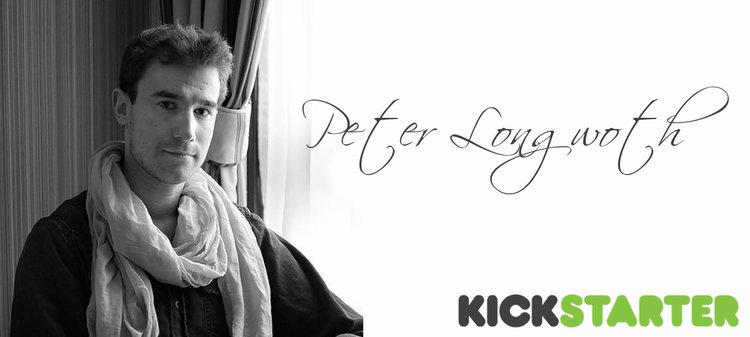Inside A Magical Mind
Peter Longworth’s energy as a young, keen composer first compelled the quartet to listen to his music. A recommendation from his composition teacher at the Guildhall School of Music that his was ‘a name to watch’ cemented the quartet’s determination to persuade Peter to write his first trumpet quartet. Peter was still young enough to be playing trumpet in the National Youth Orchestra of Scotland at the time and Jo and Peter spent some time together in practice rooms trying out mutes and sound effects that fed into his first trumpet quartet, Colori di Roma.
A few years on and Peter Longworth is now recognised as an accomplished composer whose works have been played by members of the London Philharmonic Orchestra and the London Mozart Players. Peter will be the first reciprocate of Bella Tromba’s Young Composers Fund.

Jo caught up with him to find out where his musical inspiration comes from and what his intentions are for his second trumpet quartet.
The title of your second trumpet quartet is ‘Days of Bells and Flying Creatures’. To me that seems to set a scene. Romantic works such as Debussy’s Le Mer could be characterised as programmatic. Is that how you see your music? Does it tell a story?
Rather than telling specific stories in my music I sometimes try to evoke the atmosphere of a particular place or – to use your words – ‘set a scene’. Days of Bells and Flying Creatures is concerned mainly with sounds heard throughout the course of a day in Tuscany and I think these sounds are in themselves evocative of different settings: a church; a country lane; a farmyard.
I think being a composer must be a wonderful state of being. Do you walk around with a blank book of manuscript capturing sounds you hear or do you dream melodies? Where on earth do you find all your ideas?
I work both at home and in a cafe near where I live, and I’ll often think a lot about the piece I’m writing whilst walking between the two. Of course, as is bound to happen, external sounds can interrupt your thought procesess when you are walking, but this isn’t necessarily a bad thing as these sounds can spark new ideas. With Days of Bells and Flying Creatures I recorded the sounds that surrounded me on a daily basis during a residency in Italy – tolling bells; birdsong; the buzzing of insects – before transcribing them and making them the basis of the piece. As for your question about dreaming music, yes, that does indeed happen from time to time!
It’s wonderful that you like to work closely with the performers that you are writing for. How does it feel hearing your piece come alive during rehearsals? Is it very different to just hearing the final result at the premiere performance?
Premieres are fun – if slightly nerve-wracking – occasions, but I probably enjoy the rehearsal process most of all. Being with performers as they discover a new piece can be a magical feeling and, interestingly, I find that I learn new things about my own work when hearing it rehearsed in detail. From a practical point of view, working closely with musicians also makes it much easier to discuss how the music might be interpreted and these conversations can make a real difference to the final performance.
How do you approach writing for brass instruments? Does it feel very different to writing for strings or wind?
One of the things that I love about being a composer is the challenge of writing for different types and combinations of instruments, and often the natural properties of a group of instruments will shape the kind of music that I write for them. As a trumpeter myself I feel rather at home when writing for brass, but it is important to keep an open mind and not get too comfortable. For example, when composing this particular piece I wrote down some ideas that I later realised would be better suited to a piece for string orchestra that I have to write!
Have you written for the bass trumpet before?
No, this was my first experience of composing for the bass trumpet, but I certainly hope that it won’t be my last! It’s a wonderfully expressive instrument with a rich sound and I have written plenty of melodic lines for it to play in this piece.
You explored the different sounds created by mutes in your first trumpet quartet Colori di Roma. Will you use mutes for ‘Days of Bells and Flying Creatures’?
Absolutely. I love the range of timbral possibilities that mutes can offer and in ‘Days of Bells and Flying Creatures’ I’ve used various types of mutes in different combinations to capture the ringing of bells, as well as to mimic the flying creatures of the title!
Do you have any advice for young composers?
I like to think that I’m still a young composer myself, but I think it is important for a composer to be able to put himself or herself in the shoes of a performer, and a good way of doing this is by playing an instrument, and – if at all possible – playing in an ensemble (something I’ve just started to do again after a few years).
 Previous post
2017 Best Bits
Previous post
2017 Best Bits
 Next post
Young Composers Fund
Next post
Young Composers Fund
